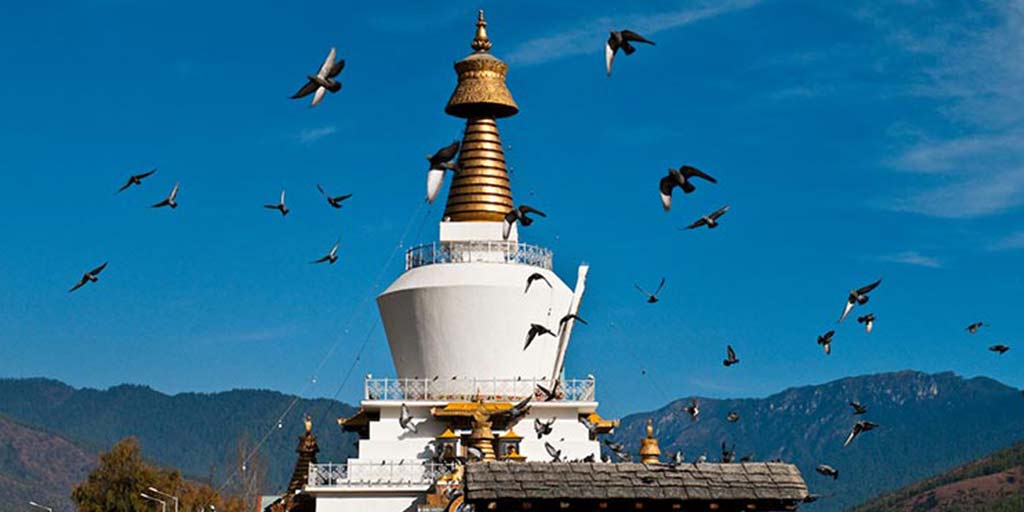Bhutan Travel Guide for Brits: Insider Tips & Must-Sees
Introduction to Bhutan
Brief Overview of Bhutan
Bhutan, the Land of the Thunder Dragon, is a small Himalayan kingdom nestled in the Eastern Himalayas. It is well-known for its stunning landscapes, rich cultural heritage, and unique concept of Gross National Happiness.
With a population of around 800,000 people, Bhutan is famous for its preserved natural environment and strong emphasis on sustainable development. The country's traditional architecture, colourful festivals, and warm hospitality make it a hidden gem for travellers seeking an authentic and off-the-beaten-path experience.
Why Brits Should Visit Bhutan
Brits should consider visiting Bhutan for its unspoiled beauty, vibrant culture, and serene atmosphere. The country offers a peaceful retreat from the hustle and bustle of modern life, allowing visitors to immerse themselves in a tranquil and spiritual environment.
Whether exploring ancient monasteries, embarking on scenic treks, or simply enjoying the breathtaking views of the Himalayas, Bhutan has something to offer every type of traveller.
Additionally, Bhutanese cuisine, known for its spiciness and flavours, is a treat for the taste buds. Overall, a visit to Bhutan promises a unique and enriching experience that will leave Brits with lasting memories of this charming Himalayan kingdom.

Planning Your Trip
Visa Requirements for British Citizens
When planning your trip to Bhutan as a British citizen, it's essential to note that you will need a visa to enter the country. Unlike many other destinations, visiting Bhutan requires tourists to book their trip through a licensed Bhutanese tour operator.
The operator will then arrange the necessary visa documentation for you. It's crucial to ensure your visa application is processed well in advance to avoid any last-minute hiccups and delays in your travel plans.
Best Time to Visit Bhutan
The best time for Brits to visit Bhutan is during the spring and autumn seasons. In spring (March to May), the valleys come alive with blooming rhododendrons and other colourful flowers, creating a picturesque backdrop for your exploration. The autumn months (September to November) offer clear skies, perfect for capturing stunning views of the snow-capped Himalayan peaks. These seasons provide ideal weather conditions for trekking, cultural festivals, and other outdoor activities.
However, it's important to note that Bhutan experiences heavy rainfall during the monsoon season (June to August), which may hinder certain travel plans. Plan your trip accordingly to make the most of your visit to the Land of the Thunder Dragon.
Getting to Bhutan
Flights to Bhutan
If you're a British citizen planning your journey to Bhutan, getting there involves taking a flight. Currently, there is only one international airport in Bhutan - Paro International Airport. Druk Air, Bhutan's national carrier, and Bhutan Airlines operate flights to Paro from a few cities such as Bangkok, Delhi, Kolkata, and Kathmandu.
As a British passport holder, you will need a visa to enter Bhutan, which can be arranged through a licensed Bhutanese tour operator in advance. The flight into Paro is renowned for its scenic views of the Himalayas, making for a memorable start to your Bhutanese adventure.
Overland Travel Options
Overland travel options are available for those seeking a more adventurous route to reach Bhutan. British citizens can enter Bhutan from India by road through Phuentsholing, the primary border town. From there, you can travel to various destinations within Bhutan by road.
However, it's important to note that travelling by road to Bhutan requires obtaining the necessary permits and adhering to the regulations set by the authorities. The overland journey offers a unique perspective on the landscape and allows you to witness the gradual transition in scenery as you approach Bhutan. Whether you choose to fly or embark on an overland adventure, planning your travel to Bhutan well in advance ensures a smooth and enjoyable experience.
Accommodation in Bhutan
Traditional Bhutanese Guesthouses
If you're planning a trip to Bhutan, you'll find a unique and immersive accommodation experience in traditional Bhutanese guesthouses. These guesthouses, known as "farmhouses," offer visitors a glimpse into the local way of life.
You can expect warm hospitality, authentic Bhutanese cuisine, and a chance to participate in traditional activities. Staying in a traditional guesthouse provides an opportunity to engage with the local community, learn about Bhutanese customs, and immerse yourself in the rich cultural heritage of the country.
Luxury Resorts in Bhutan
For those seeking a more lavish stay, Bhutan also offers luxury resorts that provide top-notch amenities and services. These resorts are designed to cater to the discerning traveller looking for comfort and exclusivity. Set amidst breathtaking natural surroundings, Bhutan's luxury resorts offer world-class facilities such as spas, gourmet dining, and personalized experiences. Whether you're unwinding after a day of exploring Bhutan's monasteries and valleys or simply indulging in a relaxing retreat, these luxury accommodations promise a truly unforgettable stay.
When it comes to choosing accommodation in Bhutan, whether you opt for the charm of a traditional guesthouse or the opulence of a luxury resort, you're sure to find a place that suits your preferences. Both options offer a chance to experience Bhutan's hospitality, culture, and beauty in distinct ways, adding to the richness of your overall travel experience. As you plan your stay in this mystical Himalayan kingdom, consider the type of accommodation that aligns with your travel style and immerse yourself in the magic that Bhutan has to offer.
Exploring Bhutan
Thimphu, the Capital City
When you venture to Bhutan, exploring its capital city, Thimphu is a must. Stroll through its bustling markets filled with colourful textiles, handicrafts, and local produce. Visit the Tashichho Dzong, an impressive fortress-monastery that houses the throne room and government offices. Admire the ornate architecture, intricate wall paintings, and serene courtyards which reflect Bhutan's rich cultural heritage.
Paro and the Iconic Tiger's Nest Monastery
In Paro, you'll encounter the iconic Tiger's Nest Monastery, perched precariously on a cliff edge. Embark on a hike through pine forests and rhododendron trees to reach this sacred site. As you marvel at the monastery's breathtaking location and panoramic views of the Paro Valley below, you'll appreciate the spiritual significance of this revered place.

Experiencing Bhutanese Cuisine
Traditional Bhutanese Dishes to Try
Delve into a world of flavours with traditional Bhutanese dishes that reflect the country's heritage. Taste ema datshi, a spicy chili and cheese dish considered the national dish, or savor momos, steamed dumplings filled with meat or vegetables.
Don't miss the opportunity to try phaksha paa, a hearty pork dish cooked with spicy red chili peppers, or indulge in jasha maroo, a savoury chicken stew infused with aromatic spices. Finish off your meal with a serving of suja, a butter tea that warms both body and soul.
Dining Etiquette in Bhutan
When dining in Bhutan, embrace the local customs to fully appreciate the gastronomic experience. Remember to use your right hand for eating, as the left hand is traditionally considered unclean. Show respect by waiting for the host to begin eating before you start your meal. It is customary to finish everything on your plate to demonstrate your appreciation for the food served.
Additionally, try to engage in light conversation during the meal, as it is seen as a way to connect and bond with your hosts. By observing these dining etiquette practices, you can fully immerse yourself in Bhutanese culinary traditions.

Cultural Experiences in Bhutan
Festivals and Events in Bhutan
Immerse yourself in the vibrant cultural tapestry of Bhutan by participating in its colourful festivals and events. The Tshechu festivals are celebrated across the country, featuring mask dances, traditional music, and rituals that hold deep religious significance. Make sure to witness Paro Tshechu, one of the largest religious celebrations in the country, where locals and monks come together to commemorate Guru Rinpoche.
Another unique event is the Thimphu Tshechu, which showcases elaborate Cham dances and attracts crowds from near and far. These festivals offer a glimpse into Bhutan's spiritual heritage and provide an opportunity to witness age-old traditions come to life.
Visiting Buddhist Monasteries
Embark on a spiritual journey through Bhutan by visiting its sacred Buddhist monasteries, known as dzongs and lhakhangs. These architectural marvels are not just religious centres but also serve as cultural hubs where locals gather for prayers and festivals. Explore the iconic Paro Taktsang, also known as Tiger's Nest, perched precariously on a cliffside and offering breathtaking views of the valley below.
Visit Punakha Dzong, a majestic fortress monastery located at the confluence of two rivers, symbolizing peace and harmony. By visiting these monastic sites, you can witness the spiritual essence of Bhutan and gain insight into the Buddhist way of life.
Practical Tips for Traveling in Bhutan
What to Pack for Bhutan
When preparing for your trip to Bhutan, it's essential to pack wisely. Due to the country's varying altitudes and climates, it is recommended to bring layers of clothing that can be easily added or removed. Include comfortable walking shoes for exploring the monasteries and dzongs.
Don't forget to pack essential items such as a hat, sunscreen, and insect repellent for outdoor activities. Additionally, consider carrying a reusable water bottle to stay hydrated during your adventures in Bhutan.
Etiquette and Customs to Respect in Bhutan
Bhutan is a country rich in tradition and culture, and it is important to respect local customs during your visit. When visiting monasteries and religious sites, remember to dress modestly and remove your shoes before entering.
It is customary to greet locals with a slight bow and a "Kuzuzangpo La" (hello) to show respect. Refrain from pointing at people or religious objects as it is considered impolite. Avoid public displays of affection, as Bhutanese society values modesty.
Additionally, refrain from smoking in public areas as it is culturally insensitive. By showing courtesy and respecting the customs of Bhutan, you will create a positive experience for yourself and the locals.
